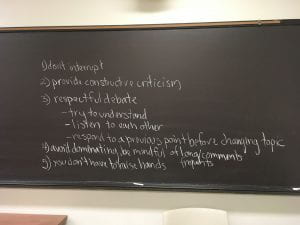 We know that teaching and learning are impacted by our surroundings and current events. With the global pandemic, political unrest, and tragedy within our community, we and our students are experiencing significant strain and anxiety. In this post, we’ll explore some different ideas of how to respond to the current moment to help facilitate learning in the classroom and well-being at home. Be sure to read to the end to see some of our suggestions for taking care of yourself!
We know that teaching and learning are impacted by our surroundings and current events. With the global pandemic, political unrest, and tragedy within our community, we and our students are experiencing significant strain and anxiety. In this post, we’ll explore some different ideas of how to respond to the current moment to help facilitate learning in the classroom and well-being at home. Be sure to read to the end to see some of our suggestions for taking care of yourself!
Address what’s going on
Our first instinct in a crisis may be to look for distractions, and this can be healthy! However, it may also be of benefit to take a few minutes in class to name some of the current stressors and acknowledge how it may be impacting students’ ability to focus on your course. Giving students a space to talk about how they’re feeling can also help them feel that you care about their well-being, which will in turn help them feel more motivated. For ideas on how to structure this discussion, take a look at “Teaching in Difficult Times: Holding a class discussion on a tragedy or crisis” by Berkeley’s Center for Teaching and Learning.
Provide resources
Let students know what resources are available to them both within the structure of your course–such as office hours, study sessions, or email–as well as those outside of your course–like the 24/7 on-call therapist, the on-call Dean of Students, or other programs. You can check out this page of resources for some ideas and even send the link to your students.
Be flexible
Deadlines and assignments are important, but you may also find that students are overwhelmed by circumstances outside of their control, like caring for an ill family member or dealing with the anxiety and stress of current events. It might be helpful to reach out to students and let them know if and how you’ll allow extensions for assignments. Maybe that means letting students know they need to reach out to you 24 hours before an assignment is due to ask for an extension, meeting with students one-on-one to discuss assignment timelines, or perhaps providing different kinds of assignments and letting students choose their own. Of course, whatever you do, make sure that you’re not creating an undue amount of work for yourself–your well-being is just as important as your that of your students!
Take care of yourself
These times are not just challenging for our students–we know each of you has had to take on the added task of learning to adjust to these remarkable circumstances, both in the classroom and in your personal lives. It’s important to take time to care for yourself! If you find you’re stuck in a rut and need some new ideas, take a look at this page dedicated to self-care suggestions for academics.
What strategies do you use to teach during challenging times? Let us know in the comments below!


